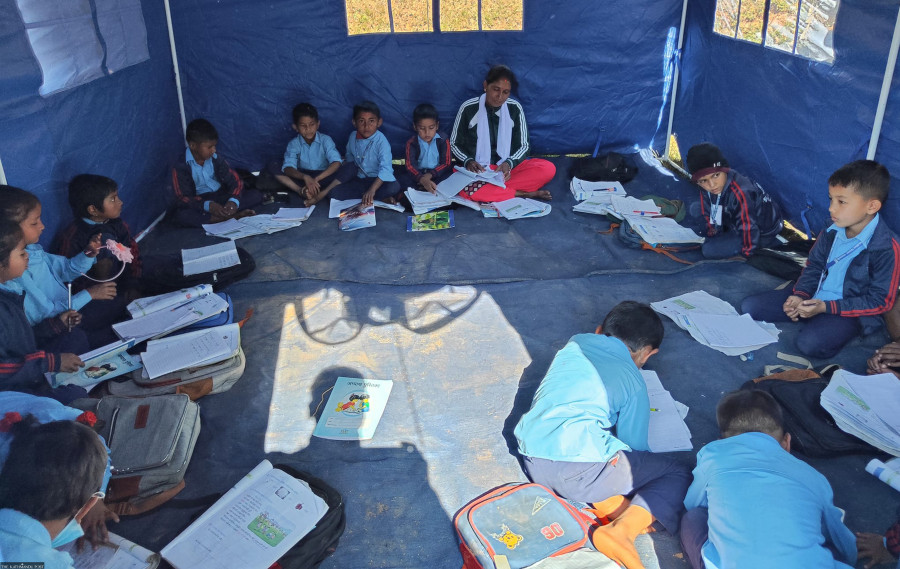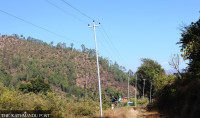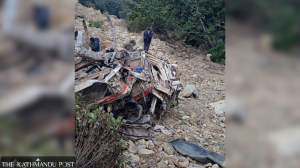Karnali Province
Earthquake-hit Salyan schools running classes out in the cold
Schools still not priority for local authorities as they are busy caring for displaced people.
Biplab Maharjan
In the November 3 Jajarkot earthquake, several school buildings in Darma Rural Municipality in the neighbouring Salyan district were destroyed and many others suffered damage to the point where conducting classes became too risky.
As there is no possibility of the government carrying out immediate repairs or reconstruction of the damaged buildings, students are having to study under open skies while some of them are making do under tents.
According to Romu Pandey, head of the education unit of the rural municipality, there are 34 community schools in the local unit. Of them, 21 suffered various degrees of damage in the earthquake—nine are completely inhabitable and 12 suffered partial damage. Similarly, 1,100 houses have become inhabitable, and more than 1,000 houses were partially damaged.
Data from the 34 community schools show that around 6,500 students are enrolled with them and, currently, around 2,500 students from nine schools are either studying in the open air or under tents.
Pandey said the schools whose buildings were partially damaged are also conducting classes out in the open due to the risk of the buildings collapsing amid continuing aftershocks. Both teachers and students are afraid to enter the damaged buildings.
“The rural municipality considered conducting classes under house-sized tents so that the students could feel warm and comfortable in the cold weather. But short on budget and resources, we could not implement the plan. Currently, the rural municipality has prioritised buying tents and other essentials for those who have been rendered homeless,” said Pandey.
“The rural municipality does not have resources to donate tents to the schools. But we could do that if the district- and province-level authorities provided support. It is hard to watch little children study outside in the cold, due to which many children are falling ill,” Pandey added.
Salyan is a hill district where the temperature hovers between 16 and 20 degrees Celsius even during the daytime in the winter season, and some places of the district do not see sun every day.
According to Resham Oli, chief administrative officer of the rural municipality, they have so far installed 40 tents in nine schools that were heavily damaged in the earthquake.
Min Bahadur Oli, principal of Janajyoti Higher Secondary School, which runs classes from kindergarten up to grade 12, said the earthquake completely destroyed some school buildings and many others are too risky to enter. The rural municipality has provided the school six house-sized tents to run classes.
“There are more than 1,600 students in the school, but the six tents can accommodate only 200 students. So we requested the rural municipality for more tents, but they said their hands were tied,” said Min.
“We are letting small children from kindergarten to grade 5 sit inside the tents regularly by taking turns, whereas students in grades 11 and 12 study outside regularly. Due to the cold weather, several children have fallen ill and stopped coming to the school,” Min added.
Dhanraj Khadka, principal of Navachetana Primary School, which runs classes up to grade 5, said that his school has also suffered damage, but the rural municipality has not provided any tent. There are around 150 students in the school.
“I requested the rural municipal authorities to give us just one tent, but they declined saying there are other schools that have suffered more damage. I understand this is a hard time for the rural municipality as they are looking after the victims, but watching small children study in classrooms with cracked walls and roofs scares me,” said Khadka.
According to Khadka, students in grades 4 and 5 are studying outside, and students in grades 1, 2, and 3 are studying inside the damaged building.
The chief administrative officer of the rural municipality, Resham, said their first priority at present is the displaced people. “Many have lost their homes. We have asked provincial and district authorities for support. We can provide more tents to more schools only when these higher authorities help us do so,” said Resam.




 13.12°C Kathmandu
13.12°C Kathmandu












